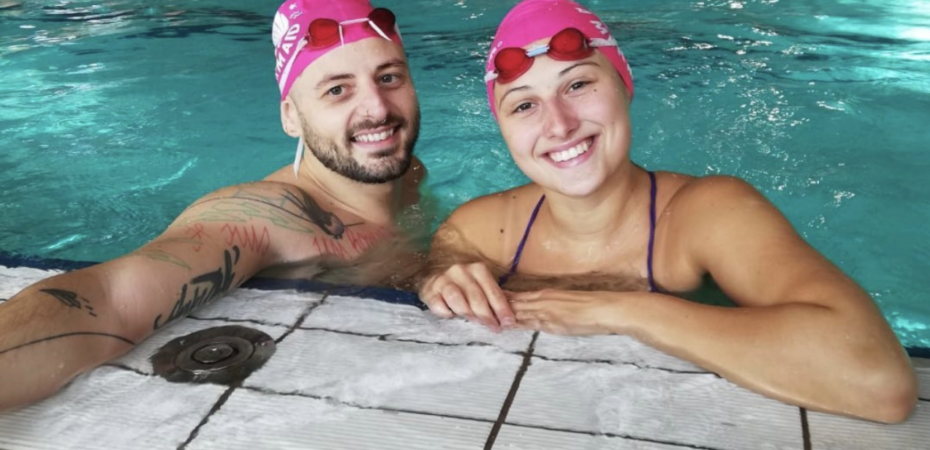Renaud Barral and Lisa Ingenito were never predestined to swim together. With a 10-year age gap, the former was already competing extensively while the latter was barely learning how to swim. Yet, their paths repeatedly crossed over the years at their club of Brussels Aquatic Synchro Swimming (BRASS). So when the time came for Barral to find a duet partner up to a new challenge, he already knew who to ask.
During his numerous years swimming in the masters category, Barral often contemplated the idea of trying out for elite. Unfortunately, the stars never fully aligned. Life got in the way, including a full-time job, a busy coaching schedule and some nagging injuries. The 33-year-old could never really take that leap of faith until now. While locked at home during most of 2020, he realized that he simply must try to make his dream come true.
Ahead of the 2022 season, the pair dreams big. They want to be the ones to bring Belgium back to a senior European Championships for the first time since 1999. But to even be allowed to book a plane ticket to Rome, they must first reach the limit of 73 points imposed by the federation.
Inside Synchro: What an adventure you two have started! How did you find each other, and when did you decide you wanted to try elite?
Renaud Barral: It was first back in 2014, when it was announced mixed duets would be included at the 2015 World Championships in Kazan. I have known Lisa since she was 10, and she had been the best swimmer in our club for years. I asked her then if she would partner up with me. But there was a bit of a miscommunication between us and we never ended up together. I continued competing in masters, and didn’t really think much about it anymore.
After the 2017 World Masters Championships, I really wanted to try again. I had another duet partner, but it fell through. Then I suffered from a herniated disk, which slowed me down for a long time. I felt a bit deflated. In the fall of 2019, I attended a synchro clinic in Belgium where I met Eleni Kougia, Greek international judge. We talked a lot, and she succeeded in planting the seeds of elite again. But then of course, Covid-19 happened. For some reason, that’s when I realized I really had to ask Lisa again, even though we basically had no pool training time anymore.
Lisa Ingenito: I had heard that he was looking for a duet partner for a while, but never really felt concerned by it. I wasn’t sure I would be good enough, be considered for it, or if I even wanted it. It was perfectly fine for me to stay in my comfort zone. One day, he just explained everything. He was confident everything would work out between us. He has known me for a long time, has coached me before, and even swam with me in free combination one year. So, I said, ‘why not?’ We decided we would give ourselves six months or a bit more to try things whenever we could access a pool. It really did click so well right from the start, and the age difference doesn’t affect us at all.
Renaud Barral: So 2020 went by. We were innocently convinced we would have our normal training hours again that fall. Unfortunately, there were still many restrictions for adults in sports’ clubs. We started creating our choreographies in pools built solely for baby swimming lessons. It was so hot and shallow, but at least we could try things out. Evidently, it still wasn’t enough for us to condition properly or envision competing last year. We really started intensive, consistent training this past September.
IS: Tell me more about your goals for this season.
RB: The federation requires us to reach 73 points in LEN or FINA-sanctioned competitions if we want to represent Belgium at the World or European Championships. At this point, we are really eyeing Rome in August. It should leave us enough time to improve, compete, and reach that scoring limit. We think we can do it. Of course, we also know we are going to have to work very hard. We will be at the French Open in April for sure, and hope to compete somewhere else but it hasn’t been decided yet.
LI: When Renaud started talking about the Europeans, I honestly was a bit fearful at first. We have not been swimming together for a long time, and we don’t have that much time ahead of us either. My mind was racing. But now we are both so motivated and invested that I trust what we are doing. I am very confident in us and in our journey. It would be such an honor to be able to represent Belgium in a senior European Championships after such a long time and in such a new and exciting event.
RB: The absolute dream would be to participate in the Olympics. I hope that it will go through for 2028. I will be 40 then. So I won’t be very young but I will still be quite functional! We know it’s a long road ahead, but we can believe in it.
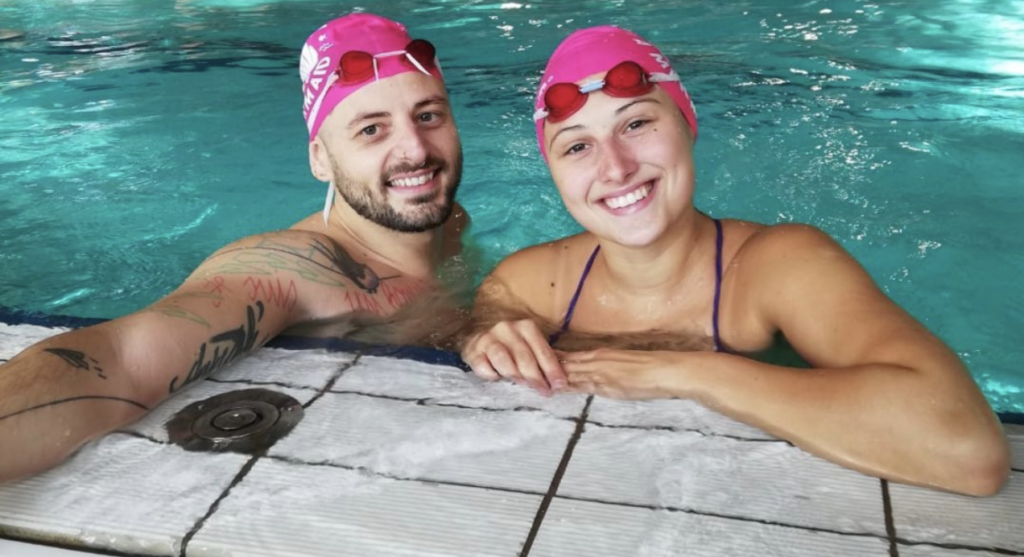
IS: What does a typical week of training look like for you? I believe you both have jobs as well.
RB: Yes. We have to manage a tight schedule. I am a payroll specialist during the day. During the week, we train in the evening whenever we can. Sometimes, it’s maybe a bit too late for me because I like my sleep (laughs)! Sunday is our big training day, where we swim five or six hours. Overall, it’s maybe 10 hours or so per week.
LI: I graduated from university last June. Now, I work part-time as a physiotherapist. I am still also doing some studies on the side, and I coach the beginners’ team twice a week. I wasn’t able to let that go yet (smiles). After I am done with them, Renaud meets me at the pool and we start our own training session. It’s indeed a lot of juggling with both of our schedules. It also often depends on the availability of our club’s coaches…
RB: Right. We have our coach here in Belgium, but she also works with other teams so it’s a bit of a puzzle to organize the schedules. Sometimes, we don’t even have a coach. Other times, we are working remotely with Susanna de Angelis [artistic swimming coach in Switzerland and mother of 2017 World champion Giorgio Minisini]. She has the experience of leading a lot of swimmers on that journey, so she understands all the milestones to reach to get there. We work with her via video calls and she has helped us fine-tune our choreographies. We also traveled to Italy last November for a training camp with her.
IS: Can you give more information about your two choreographies?
RB: Our free is basically a night under the stars in an enchanted forest. We used music from the movie Avatar and its Cirque du Soleil show. At first, we had a lot of difficulty counting the music and staying synchronized throughout. We almost changed the music entirely even though we both love it. Susanna really helped us get into it and fix our problems. We are pretty happy we can keep it in the end.
For the tech duet, I originally wanted something super energetic and happy. But Lisa and I may have faced some generational challenges in terms of musical taste (laughs). We couldn’t settle on something and searched for a long time. Eventually, we picked “Survivor” from Two Wei. We are very far from my super-happy idea, but it works. I had always wanted to swim on it anyways. Our last lap is quite hard, but I think it is a great routine overall, with well-placed and strong elements.
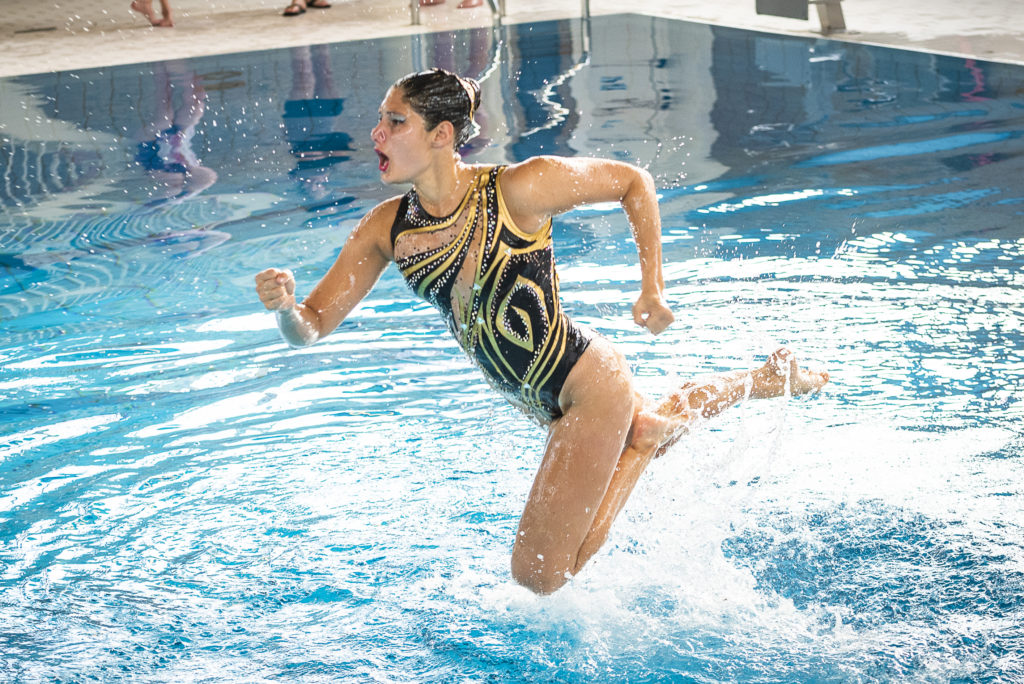
LI: We decided on the music together, but a lot of the artistic process all comes from Renaud’s brain. He definitely let his imagination run free while we were creating the routines! Of course, I had my input too. Particularly if I wouldn’t be able to do certain moves, like some requiring crazy knee flexibility. We also had a lot of feedback from coaches in our club and in Belgium, but our routines really all started with us.
RB: Both are strong in terms of artistic impression. I also don’t think people have any expectations of us. We are a small country, not often represented internationally, and in a rather new event. We could, and want to, be a nice surprise in the end.
IS: How did you two get started in artistic swimming in the first place?
LI: I took dance lessons when I was younger. Then at eight, my parents put me into swimming. My coach was a former synchronized swimmer. She suggested it to me as it combined dance and swimming, which I both really loved. I first looked at videos of the Olympic Games online, and I thought it was incredible. So I went to an open tryout at BRASS, and I enjoyed it right away. I was about nine then.
RB: I started in 2000 at the age of 12 at the club of Liège Mosan. It was during the Olympic Games. My sister and I were playing around in the pool, and my parents thought they should put my sister in synchronized swimming classes. She started, but I also wanted to. I tried and it was love at first sight. After one year with the beginners, I really wanted to compete. I was probably the weakest of my group, but I didn’t really care. I started with the U-12 team, and moved up from there.
LI: At the start of my synchro career, I also wasn’t the best one at all either. I was originally put in the U-12 team that was never supposed to go on competing. But I really wanted to, and to win medals! So I would go to the public pool with my mother just to train even more. I started to improve, and I was put into the competition groups. Eventually, I even made it onto the Belgian Francophone national team. I swam at the 2012 and 2013 COMEN Cup in solo and duet. I have been competing in the senior category for the last few years now, but it’s not as intense as it used to be when I was younger. That’s also why I said yes to this mixed duet; I wanted to challenge myself and try something new.
IS: How is this first experience swimming with a man so far?
LI: I really like it. In a duet with two women, everything often has to be the same and very synchronized. Here, we can do a lot more connected things, play together in the water, or use his great strength for acrobatics. I love having this connection while we swim. Plus, Renaud is very good with facial expressions as well, and at getting into a character. It’s really fun, and it’s making me open up more.
IS: Renaud, when did you start competing in the masters category?
RB: After the junior age group, I swam one year in the senior category as I was finishing high school. But like Lisa said, it wasn’t as intensive as before. I also studied abroad for one year, and I didn’t really swim then. When I came back to Belgium and Brussels, I had just turned 20. BRASS didn’t have a senior team back then, but it did have a group of masters. That’s how I got started.
My first season in 2009 was really fun. I competed at the Men’s Cup, the Paris International Tournament, and the World Outgames in Copenhagen. In 2013, we had a great team with a handful of men. We created a free combination with five men and five women on the theme of marriage for all. We still have a good core of men in the club nowadays.
In 2017, my duet partner Nirina and I became World champions in mixed duet. We were the only ones in our age group, so I honestly remember more the journey than the title itself. These championships in Budapest were nonetheless beautiful. We realized we would be swimming in the same pool as all the greats, walking on the same deck as them, even standing right where Italians Giorgio [Minisini] and Manila [Flamini] stood when they won their historical World title a few days earlier.
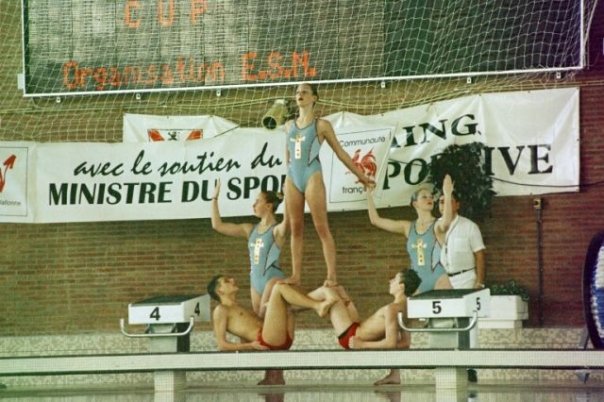
IS: Overall, it sounds like you have always been well integrated in your clubs and through the age groups, and you never felt like the odd one out.
RB: Yes. There was also another boy who was already at the club around the time I started. It helped a lot, although I don’t think he was into synchro as much as me. I got along really well with all my teammates. However when we’d go to competitions, it wasn’t always the same welcome. I was a bit like… the circus freak. Some dumbasses would call me names, insult me, use anti-LGTBQI+ slurs… Everything you can think of. Maybe I was a bit naive at the time, but I was just so happy to be doing my synchro that it all went above my head. Also, I kept getting better and I started beating some of the girls. I suppose it’s harder to make fun of somebody when they become good at what they do.
IS: Now you’re unapologetically yourself. You have many tattoos, and are not afraid to wear makeup or headpieces and to show up with unique choreographies. Overall, you don’t seem to want to shrink yourself to make other people happy, or to fit a certain mold. Was it easy for you to get to that point?
RB: First of all, I owe a lot to Bérangère Capdevielle, a coach at the Belgian Francophone Swimming Federation when I was younger. She always found the words to keep me motivated and to keep pushing me. She told me that anything was possible, and that I was my only limit in synchro.
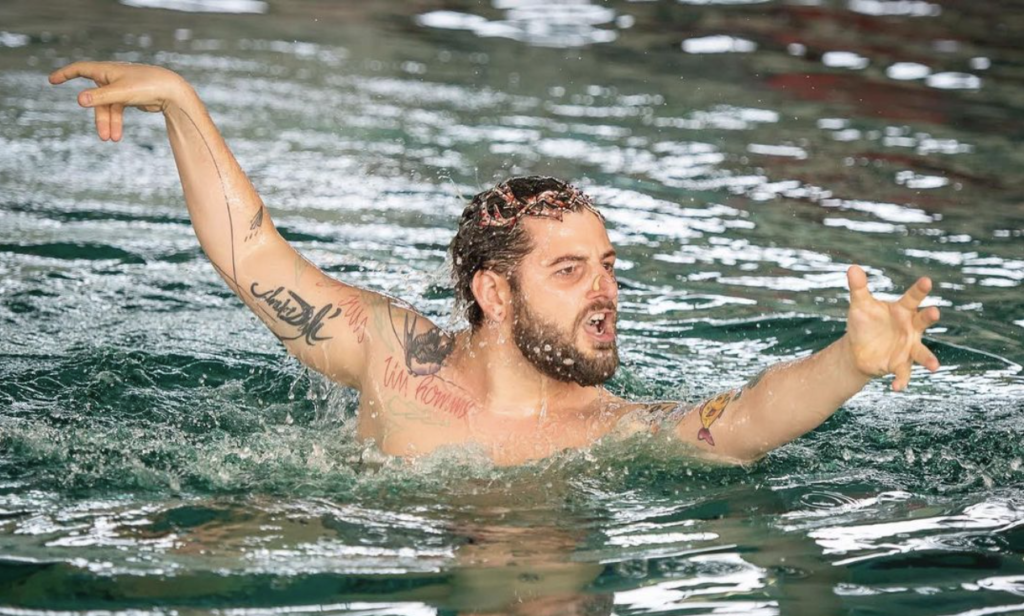
I believe she really taught me how to be a true soloist. Every time I was entered in solo, the judges would be like, “What kind of weird thing is Renaud going to show this year?” I didn’t really care; I was just doing my thing. Once, I had a Dream-themed solo, and I was swimming the entire first lap with my eyes closed in eggbeater. In 2009, I used music by Klaus Nomi, and my costume looked like his. I also did a solo on the crucifixion of Jesus two years ago. We have the chance to be in an artistic sport. So you have to use that opportunity to be creative and unique.
Second of all, I have always tried to stay true to myself. It’s hard sometimes, and it’s a balancing act. There should be some separation but without denying the existence of half of yourself either. When I swim, I like to think I am just an athlete. No sexuality or gender should come into play. For example when I started swimming in masters, there were some men who only wanted to do LGTBQI+ competitions, without much at stake. I didn’t agree with that at all. I always said we needed to also show up to ‘real’, sanctioned competitions with figures, technical events, etc.
But at the same time, I don’t think it’s fair to yourself or other people to completely overlook that aspect. It’s very powerful in a way to be openly gay in a very niche sport, and where men are even more in the minority. For me to own up to all of that can maybe give hope to others, to girls, to boys, to non-binaries… Maybe to some people who don’t feel well, who don’t feel like they can do anything or belong anywhere.
Overall, I want our sport to be more inclusive and accepting on all fronts. In 2019, I traveled to Paris for an artistic swimming introductory workshop with trans. It was great. Anyways, we all can show the way and give hope by simply being ourselves and defying the prejudices. That’s really important to me.
ARTICLE BY CHRISTINA MARMET
If you’ve enjoyed our coverage, please consider donating to Inside Synchro! Any amount helps us run the site and travel costs to cover meets during the season.

